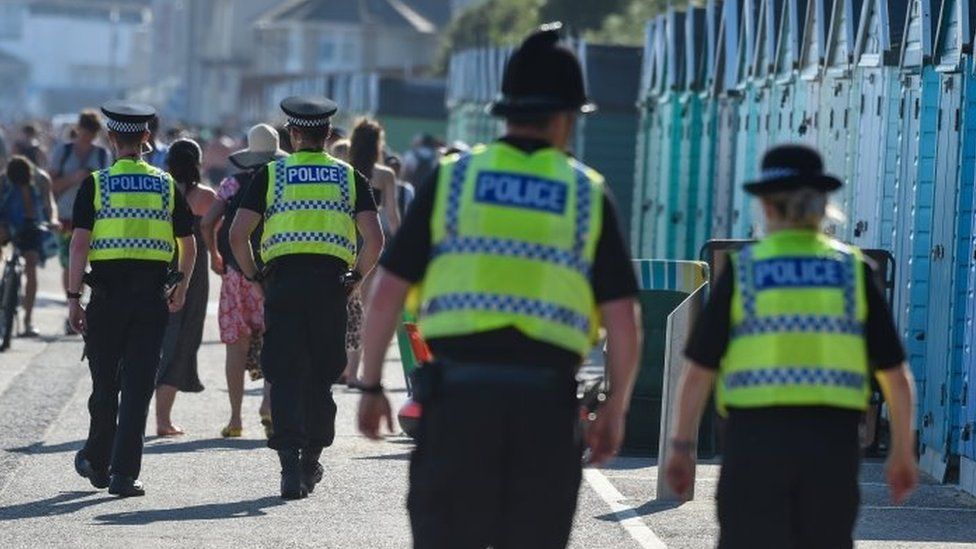Coronavirus: Police fear disorder as lockdown eases
- Published

Chief constables are understood to have expressed private concern to the Home Office that plans to ease the coronavirus restrictions might lead to a rise in public disorder.
In the last month, illegal raves and street parties involving hundreds of people have been broken up in Manchester, Oldham, Leeds, Staffordshire and a number of locations in London.
Events in Brixton on Wednesday night resulted in 22 officers being injured, vehicles set on fire and a number of arrests.
Home Secretary Priti Patel has indicated that she intends to discuss the unrest with Metropolitan Police Commissioner Cressida Dick.
Police in Dorset have said they have had to deal with anti-social behaviour and fights close to Bournemouth Beach where huge crowds led officers to declare a major incident on Thursday.
A combination of frustration after months of lockdown, warm weather and the availability of alcohol are regarded as having created a perfect storm for unrest.
Prime Minister Boris Johnson has announced sweeping changes to England's lockdown, including a relaxing of the 2m rule to a new "1m plus" rule, from 4 July.
Pubs and restaurants are among the venues which will be allowed to reopen in England as part of the easing of restrictions.
The new "1m plus" rule means that if a distance of 2m is not possible then 1m will be acceptable if certain precautions are taken, such as the use of face coverings.
'Deeply concerned'
The head of the Police Federation in England and Wales, John Apter, fears the reopening of pubs and bars in England on 4 July will put his members at risk.
"Easing of lockdown on a Saturday has created almost a countdown to carnival and I am deeply concerned that we're going to see big problems on that day," he told the BBC.
"It's only through fortune my colleagues are not being more seriously injured - or in fact killed. That's how bad it's getting, and something has to be done".
Assaults on emergency service workers in England and Wales are said to have risen by 24% in a month.
The Police Federation estimates that around 250 officers have been injured in recent weeks and the government is understood to be considering doubling the maximum sentence for those convicted of such crimes.
Gatherings of more than six people are still currently illegal and Ms Patel is among those who have questioned whether police should have taken a more proactive approach to public order during the Black Lives Matter and other protests.
The Home Secretary is reported to have had a "firm" conversation with Avon and Somerset's Chief Constable Andy Marsh after officers decided against confronting demonstrators who pulled down a statue of the slave trader Edward Colston and threw it into the harbour.
Ben-Julian Harrington, the police national lead for public disorder, warned that intervening might have caused injuries and "violent confrontation".
One of the scientific committees advising ministers on the virus has warned that unrest could develop in "specific scenarios where police actions are experienced as excessive".
Senior officers have said that operational decisions taken during mass gatherings must ensure they don't make a difficult situation even worse.
- Published25 January 2022
- Published25 June 2020
- Published25 June 2020